🧂 Introduction
Looking to elevate your meals with something both flavorful and healthy? This pink salt recipe is exactly what your kitchen needs. Himalayan pink salt isn’t just eye-catching — it’s rich in minerals and can add a subtle, savory depth to your dishes.
In this post, you’ll learn how to make a unique Citrus-Herb Pink Salt Blend — a fragrant and zesty seasoning you can sprinkle on veggies, meats, or even popcorn. It’s easy to make, completely natural, and full of flavor.
What is Himalayan Pink Salt?
Himalayan pink salt is a rock salt harvested from the Khewra Salt Mine in Pakistan, one of the oldest and largest salt mines in the world. Unlike common table salt, it’s unrefined and hand-mined, retaining over 84 natural minerals, including magnesium, calcium, and potassium.
Historical Background:
Used in Ayurvedic medicine and ancient trade, Himalayan pink salt was once as valuable as gold. Its healing properties were praised in ancient civilizations for purifying energy, detoxifying the body, and promoting longevity.
7 Powerful Culinary Uses of Pink Salt
1. Pink Salt for Seasoning
Sprinkle it over grilled vegetables, meats, or salads for a mineral-rich finish.
2. Salt Blocks for Cooking
Himalayan salt blocks can be heated or chilled to cook steak, fish, or even serve desserts on.
3. Pickling and Fermentation
Its purity makes it ideal for pickling cucumbers or fermenting cabbage into sauerkraut.
4. Baking with Pink Salt
Adds depth to cookies, bread, or chocolate desserts.
5. Cocktail Glass Rims
Upgrade margaritas or Bloody Marys with a pink salt rim.
6. Homemade Electrolyte Drinks
Mix with water, lemon, and honey for a natural sports drink.
7. Salt Cures & Preserving Meat
Great for making gravlax or charcuterie with added trace minerals.
Let’s get started with this homemade pink salt recipe you’ll want to use daily!
📝Ingredients
| Ingredient | Quantity |
| Himalayan pink salt | 1/2 cup (coarse or fine) |
| Dried rosemary | 1 tablespoon |
| Dried thyme | 1 tablespoon |
| Dried orange peel | 1 tablespoon |
| Dried lemon peel | 1 teaspoon |
| Ground white pepper (optional) | 1/2 teaspoon |
🛒 Tip: You can find dried citrus peel in the spice aisle or make your own by drying citrus zest in a low oven.
🍽️Serving Size
- Yield: Makes about 3/4 cup of pink salt blend.
- Serving Size: 1/4 teaspoon
- Servings: Approximately 60
👩🍳Step-by-Step Instructions
✅ Step 1: Prep the Salt
If using coarse pink salt, pulse it in a spice grinder or food processor until it reaches your desired texture (fine or medium).
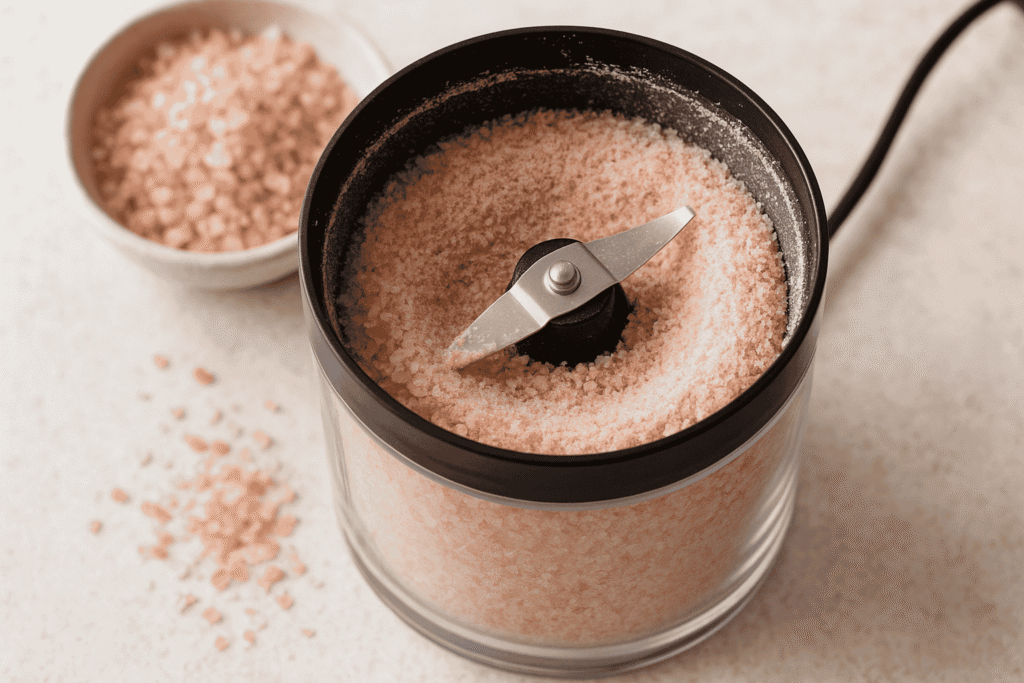
✅ Step 2: Combine Ingredients
In a mixing bowl, combine:
- Pink salt
- Rosemary
- Thyme
- Dried orange and lemon peels
- White pepper (if using)
Mix thoroughly to distribute evenly.
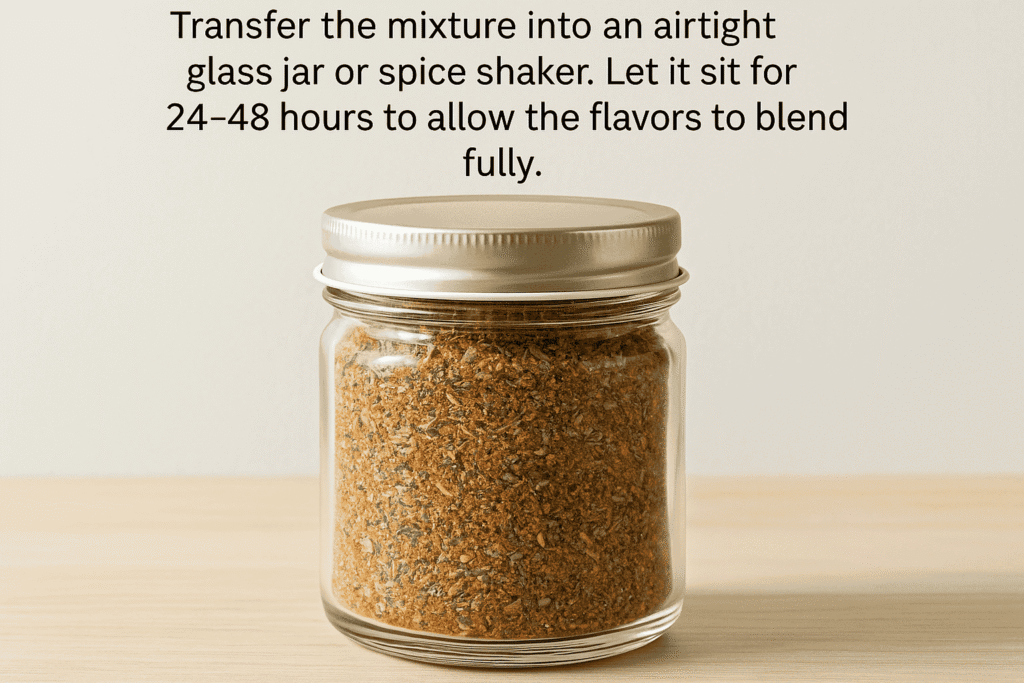
✅ Step 3: Store
Transfer the mixture into an airtight glass jar or spice shaker. Let it sit for 24–48 hours to allow the flavors to blend fully.
✅ Step 4: Use and Enjoy!
Use this blend to season:
- Roasted veggies
- Grilled chicken or fish
- Salads
- Eggs
- Popcorn
🧮Nutrition Facts (Per 1/4 tsp serving)
| Nutrient | Amount (approx.) |
| Calories | 0 |
| Sodium | 350–400 mg |
| Carbohydrates | 0 g |
| Fat | 0 g |
| Protein | 0 g |
| Fiber | Trace |
🔍 Note: Nutritional values vary depending on brand and grind of salt used.
💖Health Benefits of Pink Salt
✅ 1. Rich in Trace Minerals
Pink salt contains over 80 minerals, including calcium, magnesium, and potassium, which are missing from regular table salt.
✅ 2. Less Processed
Unlike table salt, pink salt is unrefined and chemical-free, with no additives like anti-caking agents.
✅ 3. May Support Hydration
The mineral content may help maintain electrolyte balance, which supports hydration — especially helpful for athletes or during hot weather.
✅ 4. Flavor with Less Quantity
Due to its mineral-rich taste, you may use less pink salt to get the same flavor impact, helping reduce overall sodium intake.
✅5.Balances Electrolytes
The presence of potassium and magnesium helps balance the body’s pH and maintains proper fluid levels.
✅6. Detoxification
Used in baths, it pulls toxins from the body and relaxes muscles.
🔄 Creative Ways to Use Your Citrus-Herb Pink Salt
- Stir into olive oil for a quick bread dip
- Sprinkle over avocado toast
- Season homemade fries or baked potato wedges
- Rim cocktail glasses for a savory twist (like Bloody Marys!)
📝 Final Thoughts
This Citrus-Herb Pink Salt recipe is not just easy — it’s practical, tasty, and totally customizable. Whether you’re gifting it in small jars or keeping it stocked in your pantry, this flavorful blend brings gourmet flair to everyday meals.
📣 Call to Action
Try this pink salt recipe at home and tag your creations with #PinkSaltMagic on social media! Have a twist on this blend? Share it in the comments — we’d love to see your versions!
Himalayan Pink Salt Recipe
Ingredients
Ingredient Quantity
- Himalayan pink salt 1/2 cup coarse or fine
- Dried rosemary 1 tablespoon
- Dried thyme 1 tablespoon
- Dried orange peel 1 tablespoon
- Dried lemon peel 1 teaspoon
- Ground white pepper optional 1/2 teaspoon
Instructions
👩🍳Step-by-Step Instructions
✅ Step 1: Prep the Salt
- If using coarse pink salt, pulse it in a spice grinder or food processor until it reaches your desired texture (fine or medium).
- Himalayan Pink Salt Recipe: Citrus-Herb Himalayan Salt Blend for Everyday Use
- Himalayan Pink Salt Recipe
✅ Step 2: Combine Ingredients
- In a mixing bowl, combine:
- Pink salt
- Rosemary
- Thyme
- Dried orange and lemon peels
- White pepper (if using)
- Mix thoroughly to distribute evenly.
- Himalayan Pink Salt Recipe Citrus-Herb Himalayan Salt Blend for Everyday Use
- Himalayan Pink Salt Recipe
✅ Step 3: Store
- Transfer the mixture into an airtight glass jar or spice shaker. Let it sit for 24–48 hours to allow the flavors to blend fully.
✅ Step 4: Use and Enjoy!
- Use this blend to season:
- Roasted veggies
- Grilled chicken or fish
- Salads
- Eggs
- Popcorn
Notes
🧮Nutrition Facts (Per 1/4 tsp serving)
| Nutrient | Amount (approx.) |
| Calories | 0 |
| Sodium | 350–400 mg |
| Carbohydrates | 0 g |
| Fat | 0 g |
| Protein | 0 g |
| Fiber | Trace |
❓ Frequently Asked Questions (FAQs)
1. What is the difference between Himalayan pink salt and regular table salt?
Himalayan pink salt is mined from ancient sea beds in the Himalayas and is completely natural and unrefined. It contains over 80 trace minerals like magnesium, calcium, and potassium. In contrast, table salt is heavily processed, often bleached, and contains additives like anti-caking agents and synthetic iodine.
🧂 Himalayan salt is a healthier, more mineral-rich option for cooking and wellness.
2. Can I use pink salt in all my recipes instead of regular salt?
Yes, you can substitute Himalayan pink salt in virtually any dish that calls for salt. It enhances flavor with a slightly earthy taste and provides added health benefits. However, because it’s denser, you might want to use a slightly smaller quantity to avoid over-salting.
3. Is Himalayan salt good for high blood pressure?
Himalayan salt still contains sodium, which can affect blood pressure. However, because it’s unprocessed and mineral-rich, some people find it more balanced than table salt. Moderation is key—consult your doctor if you have hypertension before making dietary changes.
4. How do I store Himalayan pink salt for maximum freshness?
Store Himalayan pink salt in an airtight container, away from moisture and direct sunlight. While it doesn’t spoil like perishable goods, exposure to air can cause clumping. Keep it dry to maintain its texture and flavor over time.
5. Is pink salt suitable for making electrolyte drinks?
Absolutely! A pinch of Himalayan salt mixed with water, lemon juice, and honey creates a natural electrolyte drink. It replenishes essential minerals like sodium, potassium, and magnesium—making it ideal post-workout or in hot weather.
🥤 This is one of the top wellness uses of Himalayan salt today.
6. Where can I buy authentic Himalayan pink salt?
Look for 100% natural, food-grade Himalayan salt from trusted sources. Brands like The Spice Lab, Sherpa Pink, and SaltWorks offer certified products. Ensure it states “mined in Pakistan” and avoid overly bleached or refined-looking salt.
7. Is there iodine in Himalayan salt?
Himalayan salt naturally contains trace amounts of iodine, but not as much as iodized table salt. If iodine is a dietary concern (especially for thyroid health), consider supplementing or choosing iodized pink salt options that are fortified.
8. Can I use Himalayan pink salt for fermenting or pickling vegetables?
Yes! Pink salt is an excellent choice for pickling and fermentation due to its purity and mineral content. Unlike table salt, it doesn’t contain additives that may interfere with fermentation, making it a top choice for sauerkraut, kimchi, and pickles.
9. Does pink salt taste different than sea salt or kosher salt?
Yes, Himalayan salt has a milder, less harsh saltiness with a slightly earthy flavor profile. While sea salt may have a briny taste and kosher salt has a larger flake texture, pink salt is more balanced and ideal for both finishing and cooking.
10. Are there any side effects of using pink salt?
While generally safe, overconsumption can still lead to sodium-related issues, just like with any salt. People with kidney disease or high blood pressure should use it in moderation. It’s not a magic cure but a healthier alternative when used wisely.
To get More recipe : Click here

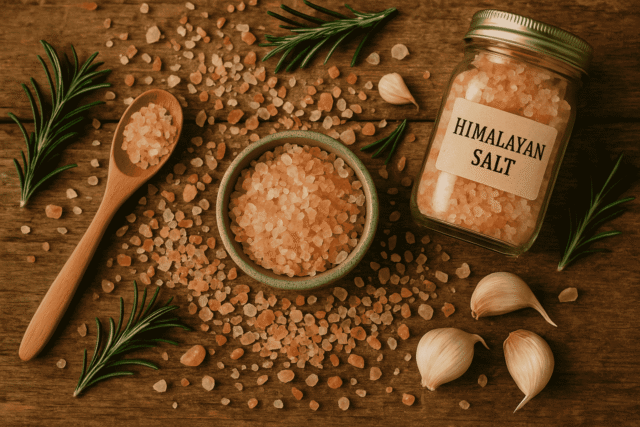
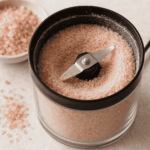
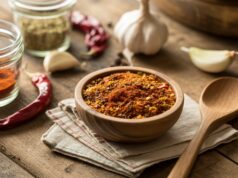
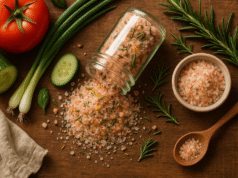



[…] Read More Recipe: Himalayan Pink Salt Recipe […]
[…] Read more Recipe: Himalayan Pink Salt Recipe: Citrus-Herb Himalayan Salt Blend for Everyday Use […]
[…] Read more Recipe: Himalayan Pink Salt Recipe […]